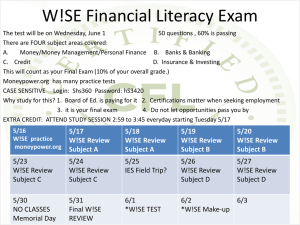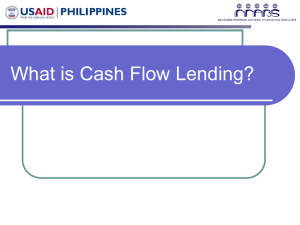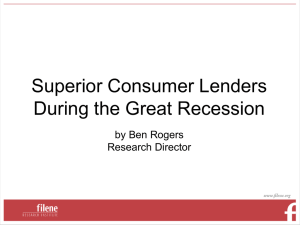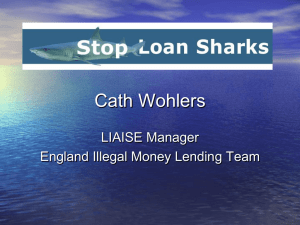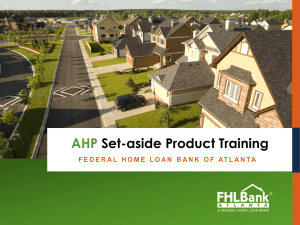Community Lending
advertisement
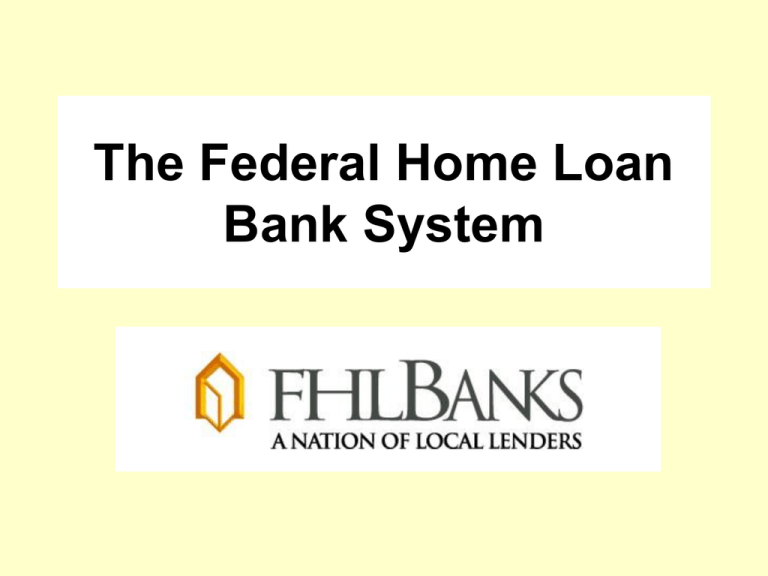
The Federal Home Loan Bank System The 12 regional FHLBanks are cooperative wholesale banks created by Congress in 1932. Their mission is to provide liquidity to support housing finance and community lending for over 8,000 local financial institutions. What are the FHLBanks? Mission is to facilitate increased homeownership and economic development, but different than Fannie Mae and Freddie Mac. Federal Home Loan Bank System Provides liquidity to financial institutions through various types of funding for residential and community development. Some FHLBanks compete with Fannie and Freddie by purchasing mortgages through their own mortgage programs. Fannie Mae and Freddie Mac buy large volumes of residential mortgages, bundle them into securities, and sell mortgage backed bonds and securities to investors. Implicit (not explicit) government guarantee on debt issues; AAA rated. Federal Home Loan Banks, Fannie Mae, and Freddie Mac are regulated by the Federal Housing Finance Agency. FHLBank Membership Composition Savings Banks & Thrifts Commercial Banks 1990 2009 2,779 1,139 55 5,706 Share Ownership by Industry Type 12/31/09 Commercial Banks Thrifts Credit Unions Credit Unions 3 1,003 Insurance Companies 4 209 Insurance The FHLBank System: How It Works FHLBanks Office of Finance Homes Investors Member Institution Community Investment Why the FHLBanks Work The Federal Home Loan Banks' cooperative structure gives members access to funding that enables them to advance credit to businesses in all economic cycles. Many large and small institutions are financing their community lending through low-cost funds from a regional Federal Home Loan Bank. For a majority of members, the Federal Home Loan Banks are the only source of access to the global credit markets. Each Federal Home Loan Bank is regionally focused and controlled, allowing it to be responsive to the specific credit needs of the communities it serves. FHLBanks’ Affordable Housing Program The Affordable Housing Program (AHP) is the largest source of private sector funds for housing and community development in the country. Funded with 10% of the Federal Home Loan Banks' net income each year. Allows for funds to be used in combination with other programs and funding sources, like the Low-Income Housing Tax Credit. Funded projects serve seniors, the disabled, homeless families, first-time homeowners and others with limited resources Since 1990, AHP has awarded over $3 billion to help fund more than 623,000 housing units have been built using AHP funds, including 391,000 units for very low-income residents. Community Lending Bank’s public service mission is to create a range of products and services to benefit its members and the communities they serve thereby fostering partnerships Grant Programs Members Outreach and Technical Assistance 8 FHLBanks Credit Programs Communities Initiatives Community Lending The FHLBanks accomplish that objective through: Affordable Housing Program—10% Bank’s profits Competitive Set-Aside (WISH and IDEA) Access to Housing and Economic Assistance for Development (AHEAD) Program—FHLBSF Initiative Discounted Credit Advances and Letters of Credit 9 Community Investment Program (CIP) Advances for Community Enterprise (ACE) Non-Housing Tax-Exempt Letters of Credit Community Lending Grant Programs Competitive AHP: Since 1990 the FHLBanks have nearly $4 billion, helping to create more than 623,000 units of quality affordable housing Since 1990, FHLBSF has awarded $632 million in grants helping to fund over 95,000 units in CA, AZ, NV, and other areas served by our members 10 Scored on a 100-point system Two annual competitions Only for low- & moderate income housing; beneficiaries earn < or = 80% of area median income Rental: monitoring for 15 years Owner-occupied: 1-time monitoring, 5 year retention Community Lending Grant Programs Homeownership Set-Aside Programs – IDEA & WISH: Since the year 2000, $22 million to 2,200 households served 11 $15,000 per household Members may reserve up to $1 million annually per program Non Competitive Offered once a year 1 year term limit for use with grant All monitoring done at time of disbursement of subsidy to the member 5 year retention Community Lending Grant Programs Homeownership Set-Aside Programs: IDEA -- Individual Development & Empowerment Account • grants matched to IDA or FSS program WISH -- Workforce Initiative Subsidy for Homeownership • grants leveraged by homebuyer’s contribution 12 Community Lending FHLBSF Affordable Housing Programs 2010 Allocations Competitive $58.8 mm* Homeownership Set-Aside $14.6 mm (IDEA: $4.345 mm, WISH: $10.25 mm) *estimated allocation including de-obligated subsidy from previous year’s set-aside and competitive programs 13 Community Lending Homeownership Set-Aside Programs – IDEA & WISH typical financing: Conventional Mortgage Conventional Mortgage Homebuyer Contribution Savings in IDA IDEA Match WISH Grant Other Grants Mortgage Assistance Programs/Other Grants 14 Community Lending Access for Housing and Economic Assistance for Development (AHEAD Program): Provides predevelopment funds Supports traditional housing projects as well as innovative economic development projects $2,519,000 awarded from 2004 to 2009 15 Community Lending Credit Programs HPA Advance Advances to modify or refinance loans of targeted homeowners potentially at risk of default on primary residence CIP and ACE Advances: Advances and LCs offered below regular rates CIP - Mainly to support residential lending ACE - Mainly to support small business and economic development lending Member limit combined $200 million 16 Community Lending Standby Letters of Credit (LOC’s) Housing Letters of Credit Non-Housing Related Tax-Exempt LOC’s (HERA) Public Purpose and Industrial Development projects Project Examples – FHLBank of Dallas Kenner Theatres, LLC Project, New Orleans, LA Member Bank: First NBC Bank Bond Issuer: Louisiana Local Government Environmental Facilities Community Development Authority Letter of Credit: $ 3.65 Million FHLBank of Pittsburgh University Student Housing, LLC Project - West Chester University of PA 17 Member Bank: Citizens Bank of Pennsylvania Bond Issuer: Chester County Industrial Development Authority Letter of Credit: $ 100.34 Million Community Lending Standby Letters of Credit (LOC’s) Project Examples – FHLBank of San Francisco McGarry Street, LLC / Green Farms Inc. – Los Angeles, CA Guy Evans Inc. – Indio, CA Member Bank: California Bank & Trust Bond Issuer: Industrial Development Authority of the City of Los Angeles Letter of Credit: $ 3 Million Member Bank: California Bank & Trust Bond Issuer: County of Riverside Variable-Rate Demand Empowerment Zone Facility Revenue Bonds Letter of Credit: $ 6 Million 2 Projects expected to retain or create approximately 325 jobs in Southern California > $28,000 per job Smallest = $1.2 million Total LOC’s Issued by FHLBanks: $ 4,097,791,031 for 158 Projects 18 Largest = $308.5 million Legislative Update In May, Rep’s Pascrell (D-NJ), Boustany (R-LA), and Kanjorski (D-PA) introduced H.R. 5311, the Community Development Financing Act of 2010 Amend the Internal Revenue Code of 1986 to make permanent the treatment of municipal bonds guaranteed by Federal Home Loan Banks as tax exempt bonds. Wall Street Reform Bill is currently in Conference Senate and House Conferees are working out differences between the two versions Plan to have President sign before July 4th Recess 19 Treasury’s Seven Questions 1) How should federal housing finance policy objectives be prioritized in the context of broader objectives of housing policy? 20 The Treasury added: “The commentary could address: policy for sustainable homeownership; rental policy; balancing rental and ownership; how to account for regional differences and affordability goals.” Treasury’s Seven Questions 2) What role should the federal government play in supporting a stable, well-functioning housing finance system and what risks, if any, should the federal government bear in meeting its housing finance objectives? 21 The Treasury added: “The commentary could address: level of government involvement and type of support provided…role of private vs. public capital…role of any explicit government guarantees; role of direct subsidies…how to balance the retention and distribution of risk…and mechanisms for dealing with episodes of market stress.” Treasury’s Seven Questions 3) Should the government approach differ across different segments of the market? And if so, how? 22 The Treasury added: “The commentary could address: differentiation of approach based on mortgage size or other characteristics …differentiation in mechanisms to convey subsidies.” Treasury’s Seven Questions 4) Should the current organization of the housing finance system be improved? 23 The Treasury added: “what aspects should be preserved…optimal general organizational design and market structure, capital market functions, sources of funding…the role of existing government sponsored enterprises.” Treasury’s Seven Questions 5) How should the housing finance system support sound market practices? 24 The Treasury added: “The commentary could address…how best to balance risk and access; and extent to which housing finance systems that reference certain standards and mortgage products contribute to this objective.” Treasury’s Seven Questions 6) What is the best way for the housing finance system to help ensure consumers are protected from unfair, abusive or deceptive practices? 25 The Treasury added: “The commentary could address level of consumer protections and limitations, supervising agencies…and role of consumer education.” Treasury’s Seven Questions 7. Do housing finance systems in other countries offer insights that can help inform U.S. reform choices? Comment Period Closes July 21, 2010 TREAS-DO-2010-0001-0012.1 This is comment on PROPOSED RULE: Public Input on Reform of the Housing Finance System Docket ID: TREAS-DO-2010-0001 26 Poised for the Future The Federal Home Loan Banks are the critical liquidity source that fund our financial institutions so our communities have access to credit. In a restructured financial system, the Federal Home Loan Banks will continue to function as steady and reliable funding mechanisms for housing, jobs, and economic development. For more information: Council of Federal Home Loan Banks www.FHLBanks.com
